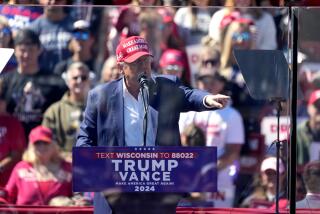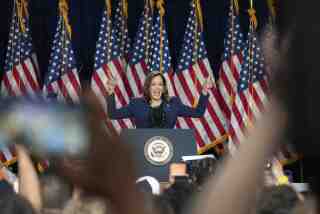Democrats Pin Hopes on Wisconsin
- Share via
MILWAUKEE — Sen. John F. Kerry and his two main rivals took a final sprint across snowy Wisconsin on Monday, seeking support in a primary today that could possibly settle the fight for the Democratic presidential nomination just about a month after the first votes were cast.
Kerry hoped to extend his winning record to 15 of 17 contests, in effect locking down the nomination and turning the rest of the campaign season into an extended victory lap.
Sen. John Edwards of North Carolina and former Vermont Gov. Howard Dean were battling for second place and political survival, though each said he would go on regardless of the outcome.
There are 72 delegates at stake in Wisconsin. Going into the primary, Kerry leads with 578 delegates, Dean has 188 and Edwards has 166, according to the latest tally by Associated Press. It takes 2,161 delegates to win the nomination.
Many observers said only one of the two could seriously continue if, as polls suggest, the Massachusetts senator prevailed by a wide margin. Even then, they said, the Democratic front-runner would be exceedingly difficult to overtake.
“The voters, donors and activists have already coalesced around Kerry,” said Donna Brazile, a party strategist who ran Vice President Al Gore’s 2000 campaign.
But Brazile added: “As a voter and a Democrat I’d like to see the race go on for another couple of weeks. I think it would be good for both John Kerry and the party to let California and New York and a few other big states have their say.”
Edwards and Dean, campaigning with no letup, said talk of dropping out of the race was premature.
At a stop in Appleton, Edwards said for the first time that he would continue campaigning even if he finished third today behind Kerry and Dean. “I’m in this very much for the long haul,” he told reporters.
As if to underscore his resolve, the senator criticized his rivals by name -- something he rarely does -- for supporting trade deals that many here blame for Wisconsin’s big loss of manufacturing jobs over the last three years.
“I respect very much Gov. Dean and Sen. Kerry. But they supported NAFTA,” Edwards said of the 1993 North American Free Trade Agreement between the U.S., Mexico and Canada. “I did not.”
Dean, amid continued upheaval within his campaign, flew to four different cities to coax his supporters to the polls. The former governor insisted he too would stay in the race regardless of what happened in Wisconsin, a state he once called do-or-die.
But he sent mixed signals during the day, alternately chiding reporters for writing “campaign obituaries,” then occasionally lapsing into the past tense to describe his candidacy.
While Edwards was sharpening his pitch, Dean was moderating his tone. After taking hard swings at Kerry last week, the former Vermont governor called both of his opponents “fine people” and criticized them in mostly general terms.
At a news conference in Wausau, he acknowledged the departure of his campaign chairman, Steve Grossman, who defected to Kerry on Sunday with a suggestion that Dean quit the race if he lost Wisconsin. “I bear no ill will to Steve Grossman,” Dean said, though he rejected his advice.
“I’ll speak for the campaign,” Dean said.
For his part, Kerry continued to ignore his Democratic rivals, pounding away at President Bush and his handling of the economy.
In the course of a 15-hour campaign day, the Democratic front-runner held a town hall meeting at Northcentral Technology College in Wausau, where students presented him with a 40-pound aluminum plaque engraved, “Wisconsin Backs Kerry in 2004.”
“I appreciate it very much,” the candidate said, wiping the keepsake with a cloth. “Make it come true on Tuesday.”
Speaking to several hundred students and supporters, Kerry mocked Bush’s Sunday appearance at the Daytona 500 in Florida, saying that in the three hours it took to complete the NASCAR event, America lost 350 manufacturing jobs, fell $170 million deeper in debt and added 700 people to the rolls of the uninsured.
“We don’t need a president who just says, ‘Gentlemen, start your engines!’ ” Kerry said. “We need a president who says, ‘America, let’s start our economy and put people back to work.’ ”
After a week of far-flung contests, the Wisconsin primary brought the candidates together for possibly the last time.
On a sunny day with temperatures in the 20s and 30s, the state had the feel of a giant game board, with presidential hopefuls moving like chess pieces from union halls to college campuses to hotel ballrooms. At one point, when Dean’s two campaign planes landed at the airport in rural Mosinee, they pulled up between Edwards’ and Kerry’s aircraft.
The race has been dramatically transformed since the Jan. 19 caucuses in neighboring Iowa. Kerry’s surprise victory there and his big win the following week in New Hampshire gave him a huge head of steam that shows no sign of dissipating. The nine-candidate field has been cut nearly in half over the past month, leaving Kerry, Dean, Edwards, Rep. Dennis J. Kucinich (D-Ohio) and the Rev. Al Sharpton of New York still in the race.
Wisconsin may further cull the field, narrowing the major contenders to Kerry and a single alternative.
“The compression of the calendar is a powerful force,” said Bill Carrick, a former strategist for Rep. Dick Gephardt of Missouri, who quit the presidential race after his fourth-place finish in Iowa. After Wisconsin, the Democratic race will spread coast to coast for the next two weeks, culminating in March 2 contests in California, New York, Ohio and seven other states.
“Combine that with the electability argument that is so strong with Democratic primary voters, and there’s not a lot of traction for anyone to effectively challenge Kerry,” Carrick said.
Edwards, however, was buoyed Monday by the endorsement of the Milwaukee Journal Sentinel, the state’s most influential paper, and the largely positive reviews for his performance in Sunday night’s debate. Making an arc across the state, he stumped in South Milwaukee, then flew to Appleton, Wausau and Eau Claire.
Asked by reporters whether it was too late for him to go on the offensive against Kerry, Edwards said no. “It’s not too late, because this primary process is going well into March, and I want voters to know what the differences are,” he said -- including his opposition to NAFTA and Kerry’s support for it.
The trade issue came up at Kerry’s first stop of the day at the technical college in Wausau when a woman in the audience said his support for NAFTA threw up “some red flags” for her. After working 22 years in the same factory, the woman said, she lost her job last year. She blames the trade agreement.
In response, Kerry said that when NAFTA first took effect, the U.S. gained more jobs than it lost because of increased access to Mexican markets. But as time went on, he continued, the side agreements that were supposed to enforce labor and environmental standards were ignored, “and we slid backwards.”
Kerry turned the discussion into an attack on Bush, saying, “We’re not creating the jobs here at home.”
“If we had had a normal recovery ... we would have created 7 million new jobs over the course of the last 2 1/2 years,” he said. “Instead, we lost 2 1/2 to 3 million jobs.... So President Bush’s recovery has been almost as bad as his recession.”
Kerry ended his day at a Green Bay rally with fellow Massachusetts Sen. Edward M. Kennedy, who recalled visiting the state during his brother’s 1960 primary campaign. Wisconsin voters gave John F. Kennedy a crucial victory over next-door neighbor Hubert H. Humphrey of Minnesota.
“Do for [Kerry] what you did for my brother,” Kennedy told a packed gym at the University of Wisconsin. “He’ll be a great president.”
*
Times staff writers Matea Gold and Maria L. La Ganga contributed to this report.
More to Read
Get the L.A. Times Politics newsletter
Deeply reported insights into legislation, politics and policy from Sacramento, Washington and beyond. In your inbox twice per week.
You may occasionally receive promotional content from the Los Angeles Times.











